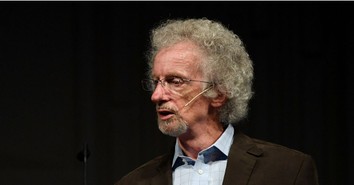Are We Nation Building or Kingdom Building?

In our partisan climate, it is becoming increasingly harder to discern a Christian consensus on how the church should engage with our culture. It is a frequent occurrence for brothers and sisters in the faith to find themselves on opposite sides of a given issue, arguing for completely different approaches. How can we rise above the cacophony? How can we wisely and redemptively interact with our culture?
The answer to these questions is complex and multifaceted. For our purposes, we will narrow our focus to two competing views on Christian cultural engagement. The first we will call Nation Building, and the second we will label Kingdom Building.
Nation Building focuses on the temporal: prioritizing and emphasizing one’s earthly citizenship, and interacting with one’s culture primarily as a native or citizen. Kingdom Building, on the other hand, focuses on the eternal: prioritizing and emphasizing one’s heavenly citizenship, and interacting with one’s culture primarily as an alien or foreigner.
It seems obvious that the second view is superior to the first. Nevertheless, we can fall prey to the Nation Building approach without even realizing it. In an effort to avoid that error, let us examine the two approaches in more detail.
Photo Credit: ©GettyImages/Denisfilm
Nation Building
This approach involves an emphasis on acquiring or taking back a literal geographical location—often a country or continent of some kind. This mode of engagement is best illustrated by the Israelite conquest of Canaan.
While Israel followed God’s call to take a specific plot of land, such an approach to cultural engagement was limited in time and scope, and foreshadowed something greater to come. (More on that in a bit.) While we may readily acknowledge the temporary nature of Israel’s conquest strategy, we must guard against smuggling this strategy into a modern-day context. Let’s examine three potential ways we can do this.
1. Departing from God’s Will
Nation building can lead to going beyond God’s instructions. This can happen either by making alliances we shouldn’t or creating enmity where we shouldn’t.
One example of making allies where we shouldn’t is found in Joshua 9. Shortly after entering Canaan, Joshua encounters a group of local people who claim to be from a faraway land, eager for a peace treaty with Israel. After first responding with suspicion (and rightfully so), God’s people let themselves be deceived because they do not “inquire of the Lord” on the matter (v. 14).
One example of making enemies where we shouldn’t is found in Judges 19-20. A brutally violent situation (19:25-30) leads to the tribe of Benjamin ill-advisedly mobilizing itself against the rest of Israel. This results in Benjamin being nearly decimated (20:47) by its fellow tribes.
Today, we see professing Christians making questionable political alliances and treating other believers as enemies of our cause. The dividing lines are often drawn on political or ethnic grounds, and the results are proving disastrous.

2. Making God a Political Tool
Nation building tends to encourage its adherents that God is firmly on their side (of the political, cultural, or ethnic aisle). But that is akin to the tail wagging the dog.
A dramatic example of this can be found in Joshua 5, as the Israelites prepare to march against the city of Jericho. Joshua encounters a mysterious man dressed for battle, failing to realize he is facing God in the flesh. Joshua tentatively asks, “Are you for us or for our enemies?” (v. 13).
God begins his answer by saying, “Neither” (v. 14). This is a curious response, as God himself is the one who has brought Israel into the Promised Land to establish his people and to punish the inhabitants of Canaan. And yet, even with such clear battle lines drawn, God rejects Joshua’s simplistic categorizations, because he doesn’t take sides. His cause is his own, and if his children—those on his “side”—step out of alignment, he will oppose them (see James 4:4-6).
Today, we see professing Christians all across the political spectrum claiming God is on their side. But God is not divided against himself, and he will not be used as a pawn to further causes that are not his own.
3. A Return to Inferior Methods
Merging Christianity with nation building reflects a subtle and backward shift from a New Covenant model to an Old Covenant model. All the goings-on of physical Israel, while real and historical, were nonetheless symbols of the spiritual Israel. God is not working to establish a human kingdom on some specific geographical location. Rather, he has established his church throughout the earth, and he has promised that his church will not be overcome (see Matthew 16:18).
To quote Bible commentator David Guzik, “God does not intend that there be a Christian country or state where all the Christians live together in spiritual bliss, and simply say to the world, ‘come and join us if you want.’ Instead, God wants Christians to be sprinkled throughout the whole world, influencing people for Jesus Christ.”
Today, we see professing Christians hell-bent (pardon the pun) on advancing the kingdom of God primarily through geographic, judicial, and legislative conquests. With such an off-kilter emphasis, the future of the church is confused with the future of a particular political party or movement—as if the kingdom of heaven can only advance when hitched to the wagon of an earthly ideology.
Photo Credit: ©Getty Images/Enterline Design Services LLC.
Kingdom Building
This second model of cultural engagement recognizes what we understand on this side of the cross: this world—including every continent, nation, city, and village—is not our home. “For here we do not have an enduring city, but we are looking for the city that is to come” (Hebrews 13:14).
Even the Old Testament patriarchs—those to whom God promised a literal, physical land—recognized that the ultimate fulfillment of God’s promises were found in heaven, not on earth. They confessed that they were “foreigners and strangers on earth,” and that they were “looking for a country of their own”—which is, of course, “a better country—a heavenly one” (see Hebrews 11:13-16). Even King David, who himself enjoyed the blessing of reigning within the physical Promised Land, proclaimed the following near the end of his life: “We are foreigners and strangers in your sight, as were all our ancestors” (1 Chronicles 29:15). The Promised Land of Canaan foreshadowed the true, better, and everlasting Promised Land of heaven.
Interestingly, the Kingdom Building model is found even in the conquest of Canaan. Whereas each of the twelve tribes of Israel were allotted large portions of land as an inheritance from the Lord, the Levites—i.e., the priests—were treated differently: “But to the tribe of Levi, Moses had given no inheritance; the Lord, the God of Israel, is their inheritance, as he promised them” (Joshua 13:33; see also Numbers 18:20ff).
Furthermore, the 48 cities where the Levites were allowed to live included cities of refuge—places where manslayers could flee for protection (see Numbers 35). Far from being a land to defend for themselves, the homesteads of the Levites were designed for the service of others.
Since the death and resurrection of Christ, all believers—not just a select few—are members of the priesthood: “you are a chosen people, a royal priesthood, a holy nation, God’s special possession…” (1 Peter 2:9). Like the Levites of Canaan, our inheritance is not a country or continent, but rather the blessing and presence of the Lord (regardless of our geographic location). Thus, we can say along with King David, “Lord, you alone are my portion and my cup; you make my lot secure. The boundary lines have fallen for me in pleasant places; surely I have a delightful inheritance” (Psalm 16:5-6).

In the World, but Not of the World
Even as members of the church universal, we are also residents—and even citizens—of various earthly nations. The point isn’t that we should keep ourselves out of the democratic process. The point also isn’t that Christians should be pacifists or anti-military. The point isn’t even that we should avoid confronting our wayward culture in its blind and insistent idolatries.
Rather, the point is that the furthering of Christ’s kingdom—our ultimate goal—comes through seeing ourselves primarily as ambassadors from another country. The state of our host country is far from unimportant, but it is possible to get so caught up in worldly pursuits that our mission becomes subservient to that of our host country. There is a difference between seeking the “peace and prosperity of the city” to which we have been exiled (Jeremiah 29:7) and going native—i.e., adopting the surrounding culture’s cares, concerns, and customs at the expense of our heavenly allegiances.
The weapons we wield are not worldly or carnal, but mighty in God (2 Corinthians 10:4). The warfare we wage is not against flesh and blood, but against spiritual forces (Ephesians 6:12). And the goal of our cultural engagement is not to “win” or conquer or beat others into submission—to find success as the world sees it—but to act as ambassadors of reconciliation (2 Corinthians 5:20).
Nation Building: Worldliness in Disguise
Worldliness involves much more than just sexual immorality and vulgar language. Worldliness can also act pietistic and moralistic. Just as both pure religion and legalism may appear similar on the outside, so worldliness can be masked by religious zeal on the outside. In many cases, Nation Building can give the appearance of Kingdom Building.
Consequently, we would do well to ask ourselves questions like these:
- Do I feel more solidarity with those who are political allies rather than theological allies?
- Am I tempted to despair if an election doesn’t go the way I think it should?
- Have I confused spiritual enemies with physical enemies?
- Am I tempted to think that the efficacy of the gospel itself is tied to the shifts of a given government?
- Do I pray for those who persecute me and bless those who curse me, rather than respond in kind (see Luke 6:28)?
- Is my posture toward ideological opponents one of ambassadorship or militant occupation?
Honestly wrestling with the answers to these questions will help us see where we may have substituted Nation Building for Kingdom Building. And if we have compromised our heavenly marching orders for a Canaanite advancement strategy, let us turn back to our original call to be a blessing to all the nations (see Galatians 3:8). In the words of Dr. Alastair Roberts,
"The commission that our ‘Joshua’ gives us is greater than that Moses gave to the first Joshua. Joshua was called to go into the land and wipe out the Canaanites by the sword: we are called to go into the whole world and cut every creature to the heart with the two-edged sword of the Spirit. The Church’s prayer, worship, and gospel proclamation is the means by which the whole world will be brought into Christ’s blessing."
Photo Credit: ©GettyImages/pcess609
Originally published September 27, 2021.









